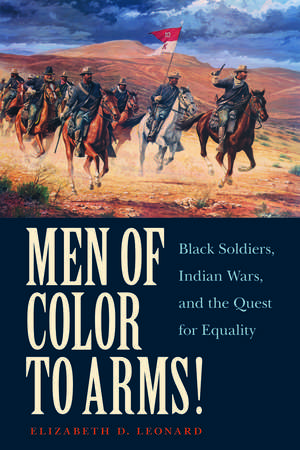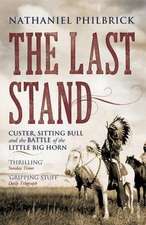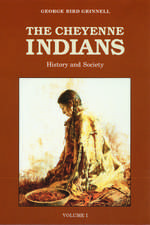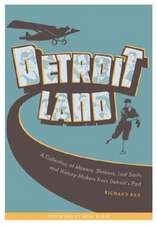Men of Color to Arms!: Black Soldiers, Indian Wars, and the Quest for Equality
Autor Elizabeth D. Leonarden Limba Engleză Paperback – 31 mai 2012
In 1863, at the height of the Civil War, Frederick Douglass promised African Americans that serving in the military offered a sure path to freedom. More than 180,000 black men heeded his call to defend the Union, only to find that the path to equality would not be so straightforward.
Drawing on eye-opening firsthand accounts, Elizabeth D. Leonard restores black soldiers to their place in the arc of American history, from the Civil War and its promise of freedom up to the dawn of the twentieth century and the full retrenchment of Jim Crow. Along the way, Leonard offers a nuanced account of black soldiers’ involvement in the Indian wars, their attempts to desegregate West Point and gain proper recognition for their service, and their experiences during Reconstruction, as blacks worked to secure their place in an ever-changing nation. With abundant primary research, enlivened by memorable characters and vivid descriptions of army life, Men of Color to Arms! is an illuminating portrait of a group of men whose contributions to American history, as this book abundantly demonstrates, merit a more thorough examination.
Preț: 116.09 lei
Nou
Puncte Express: 174
Preț estimativ în valută:
22.22€ • 23.11$ • 18.34£
22.22€ • 23.11$ • 18.34£
Carte disponibilă
Livrare economică 24 martie-07 aprilie
Preluare comenzi: 021 569.72.76
Specificații
ISBN-13: 9780803240711
ISBN-10: 0803240716
Pagini: 344
Ilustrații: 46 illustrations
Dimensiuni: 152 x 229 x 15 mm
Greutate: 0.47 kg
Editura: BISON BOOKS
Colecția Bison Books
Locul publicării:United States
ISBN-10: 0803240716
Pagini: 344
Ilustrații: 46 illustrations
Dimensiuni: 152 x 229 x 15 mm
Greutate: 0.47 kg
Editura: BISON BOOKS
Colecția Bison Books
Locul publicării:United States
Notă biografică
Elizabeth D. Leonard is the John J. and Cornelia V. Gibson Professor of History at Colby College and the author of five books, including Lincoln’s Avengers: Justice, Revenge, and Reunion after the Civil War and Lincoln’s Forgotten Ally: Judge Advocate General Joseph Holt of Kentucky.
Cuprins
Preface
Acknowledgments
1. Wanted: Black Men for Federal Army Service
2. Black Soldiers Go West
3. Doing the Nation's Work on the Western Frontier
4. National Progress, Race Thinking, and Taking On West Point
5. Insult and Injury
6. Struggling for Citizenship in the 1890s
Notes
Index
Recenzii
“The richness of [Leonard’s] stories shines through, and first-person accounts of hardships suffered on the plains are especially gripping.”—Publishers Weekly
“Brimming with life and in the words of those who struggled, Men of Color to Arms! is an indispensable addition to African-American historical literature. Those unfamiliar with this overlooked and long-neglected story will find illumination in Leonard’s highly recommended book.”—James A. Percoco, Civil War News
“One of the most useful books to come out of the United States in recent years. . . . Leonard looses a cannon of detail that embraces both Army life and the tests that they faced to gain equality.”—Colin Gardiner, Oxford Times
“Once again Elizabeth Leonard demonstrates the versatility and range of her skills as a historian and writer. This penetrating account of the black regular regiments in the U.S. army after the Civil War joins her earlier studies of women during the Civil War and the prosecutors of Lincoln’s assassins on a select shelf of important books.”—James M. McPherson, author of Battle Cry for Freedom
“Men of Color to Arms! is not only the most complete study ever written of the important service black soldiers rendered during the Indian wars of the American West, but it also offers in clear and finely crafted prose new insight into the role their service played in the larger context of the struggle of blacks for equal rights in the decades following the Civil War.”—Peter Cozzens, author of Shenandoah 1862: Stonewall Jackson's Valley Campaign
“Leonard’s study is notable for recovering from the record, often from first-hand accounts, a plethora of names and cameos of black soldiers to give a sense not just of the scale of their participation in ‘doing the nation’s work,’ but [also] its consequences.”—Christine Bold, Times Literary Supplement















